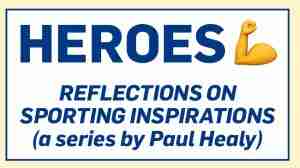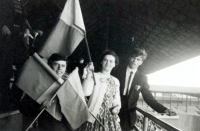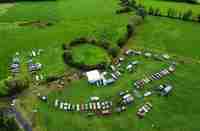 ‘Great sporting performances have always grabbed the imagination of the young of all ages as they fantasize about emulating the glorious feats of their heroes. William Butler Yeats exhorted people to go to their graves empty, having not wasted a moment of their lives. Dermot need have no worries on that score. It is given to few mortals to become eternally remembered after their stint in this vale of tears is over, even fewer as a consequence of their achievements on the GAA fields. With the passing years names like Christy Ring and Seán Purcell have an even stronger evocative power: they are a chant, an invocation, a beckoning magic for fans. Dermot belongs in such elite company. He will forever remain a true Roscommon icon’
‘Great sporting performances have always grabbed the imagination of the young of all ages as they fantasize about emulating the glorious feats of their heroes. William Butler Yeats exhorted people to go to their graves empty, having not wasted a moment of their lives. Dermot need have no worries on that score. It is given to few mortals to become eternally remembered after their stint in this vale of tears is over, even fewer as a consequence of their achievements on the GAA fields. With the passing years names like Christy Ring and Seán Purcell have an even stronger evocative power: they are a chant, an invocation, a beckoning magic for fans. Dermot belongs in such elite company. He will forever remain a true Roscommon icon’
– From ‘Dermot Earley: An officer and a gentleman’ by John Scally
- By the time I was allowed join the wonderful crepe paper-wearing excursions – bundled into modest, rattling cars to travel to Roscommon games, conditioned to expect that the day would only bring joy – his reputation preceded him. He was our Superman; for a few summers we had already been daydreaming that we ‘were’ him. Already, the imprint of his greatness lingered in every part of the country, on modest pitches and in our finest stadiums, where hundreds of thousands of people had inevitably found their county loyalties at least briefly suspended as their senses succumbed to the magnificence of this modern-day chieftain.
Discovering Gaelic football as a young boy in the mid-1970s, I realised that ours was a multi-gifted team that could strut with the best in the land, and that its leader and chief – the man who, according to our crepe hats, would lead us to ever-newer heights – was also a role model for footballers everywhere, a symbol of sportsmanship, a man of eminent stature who commanded the respect and affection of the nation. I realised that a burgeoning golden era in Roscommon football was perhaps the happy consequence of a perfect storm…the emergence of a marvellous generation of players, visionary management, and the calming, inspirational presence of a unique man…a Chieftain in football boots.
I’m conscious, in writing this, that I missed his many notable feats from his emergence in the mid-1960s through to the beginning of the 1977-80 glory era. I’m no expert on Dermot Earley. Others are. But I must include him in this ‘Heroes’ series, because the Michael Glavey’s man was a true hero to thousands of GAA fans, me included. This man was in the business of sportsmanship and the modest pursuit of excellence.
He was much decorated – an All-Ireland U-21 medal, five Connacht senior medals, a National League winner’s medal, two All-Stars, accolades aplenty. He was the first player to play county minor, U-21 and senior football in the same year.
And yet, inevitably it seems, any profile of or conversation about Dermot Earley will almost certainly categorise him as ‘one of the best players never to win an All-Ireland’…
It matters. Of course it matters. Even now, close your eyes and you can time travel to the wretched broken dreams of 1980. I can’t imagine how raw it might still be for the players. Of course it matters. But Dermot Earley’s football legacy is not dependant on scrutiny of any roll of honour. There was, cruelly, no All-Ireland senior medal on Dermot’s mantelpiece, no such medal in the mythical ‘back pocket’, which, as ‘GAA Man’ would have it, supposedly empowers the bearer to forever more puff his chest out and hold his head above the rest.
Dermot could puff his chest out in any company, though modesty dictated he was slow to do so. No, I venture to suggest, that the absence of an All-Ireland senior medal takes nothing from the enduring legend of the man. Certainly it’s unfortunate, for it would have been richly deserved. But we do not measure greatness by the glint of gold. We all know the quirks of sporting fate. Lesser players reached the Promised Land in Croke Park. And good luck to them. Dermot Earley’s legacy is built on our memories of his feats. Think of what we saw and felt when Dermot Earley was on the field, and think nothing much of the medal that never came. Think of the magnificence of his fielding, those powerful runs, his assured free-taking, the inspirational scores, his sportsmanship, his leadership, think of this force of nature who thrilled his people. The medal, close enough in 1977 and 1979, in 1980 especially – when on a fateful day Dermot and his colleagues left 15 of them behind – would have been a fitting prize for a Chieftain. But he was a GAA great who did not really need the affirmation of gold. Walk into a room with three All-Ireland winners to the right of you, and Dermot Earley to your left, and chances are you’d have been drawn to the pride of Gorthaganny.
If his name wasn’t Earley, some genius would have come up with some other pun. No need. The hats and flags bore the slogan: ‘Earley to rise’.
We clambered into different cars on different days, several kids in the back, all of us hyper with the pulsating promise of the day. It makes no sense to suggest it, but was it always sunny? Flasks of tea and sandwiches for the adults, crisps and minerals for the kids. The crepe hats were basic, but worn with enormous pride. The Hyde was home, other Connacht grounds part of a kingdom which Roscommon ruled. Croke Park was the Holy Grail. At Dorset Street we accepted our culchie casting in this drama. The excitement was almost overwhelming. The walk along Jones Road….we wanted to get to the stadium, yet we almost feared the moment of truth. Nervous energy they might call it now. If we could stop time then, just as we took our place in the great cauldron, clutching our Roscommon flags – our heroes emerging – we might just have encountered eternal happiness.
After the 1977 Connacht final win, the anguish of a rollercoaster semi-final (Roscommon led Armagh by seven, were reeled back in for a draw, the Ulster champions winning the replay by a point). Connacht glory again in ’78, with Earley majestic in the final. Roscommon were hammered by Kerry in the All-Ireland semi-final, but completed a Connacht three-in-a-row in ’79.
The gladiatorial-like atmosphere at the 1979 All-Ireland semi-final against Dublin remains fresh in my memory. It was the last game I would attend with my brother Gerard, who died later that year. We sat, with friends, high in the Cusack Stand, gripped by the intensity of the combat below, and the thunderous noise around us. So damn close. Dublin, by a wretched point. Roscommon did win the National League Final in ‘79 (hammering Cork). I was there. Jimmy Barry Murphy (held scoreless) presumably wishes he wasn’t. As for the championship, there was always next year. Didn’t Johnny Logan sing What’s Another Year in 1980?
1980 happened, and I won’t pause there again, not this time. Roscommon left the great prize behind, into the barely grateful embrace of the mightiest team the game had ever seen. It was a wonderful Roscommon team, a joyous era, but painstakingly climbing the mountain – only to slip at the summit – had taken its toll. Who knows what despair, regret, perhaps even anger, lurked within our heroes as they togged out in ’81? Decline came earlier than might have been expected. It was over. Earley, with customary dedication and pride, played on, a great servant to the end, completing a remarkable 20-year career on a summer’s day in ’85. 20 years in a Roscommon senior jersey. Magnificent.
He was very skilled, certainly, but it was the combination of his qualities that made him the legend he became. He was a leader. One thinks of his motivational speeches over the years, including to the Roscommon minors during their All-Ireland winning campaign of 2006. Dermot Earley rose within the Irish Defence Forces, reaching the very top (Chief of Staff). Earley to rise. He also had a distinguished career with the UN and played key peacekeeping and diplomatic roles on the international stage. Yes, if he’d never kicked a football, Roscommon people would have been proud of Dermot Earley. But he did kick a football too, as it happens…
‘Men are not judged in my lifetime by the number of honours but by their behaviour in the pursuit of honours. Dermot had the greatest medal of all. He had respect. Wouldn’t that be great to have on your tombstone? “This man had great respect”’
– Jimmy Magee
I only met or interviewed him a few times, hardly ever about football. But you don’t need to know your heroes well for them to be your heroes. It’s not as if Muhammad Ali used to ring me every other week. Once, while working for the Roscommon Champion, I rang Dermot, when he was in some foreign land, engrossed in peace negotiations. We proudly published the interview on the front page. Then one year we asked if he’d honour us by launching the Roscommon Association Yearbook, which I was editing at the time. That night in Tom Maye’s in Dublin was my first time to receive one of Dermot Earley’s crunching handshakes. A sore honour, that was.
A county, and more beyond, bereft at his untimely death ten years ago this summer. His name will echo through the ages. He commanded respect. A great family man, he stood for the best of values. On the GAA pitches of the land, he rose gracefully and carried our dreams with him. A great Roscommon man. Thanks for the memories, Dermot. Chief, Chieftain, sportsman. A hero forever.






